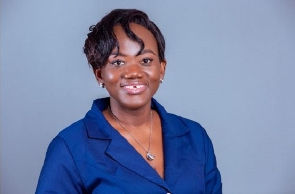The Head of Client Experience at Stanbic Investment Management Services (SIMS), Miriam Maku Amissah, has advised Ghanaians to rethink their attitude and mindset towards investment.
Speaking at the launch of Financial Literacy Month at the Chartered Institute of Bankers, she advised Ghanaians to remain calm in the face of uncertainties and seek expert advice and proper education.
She said, “Telling an investor to stay calm amid uncertainties is difficult but uncertain times are the times to be very calm. There also needs to be intense education as there are many gaps in investors’ information regarding financial institutions' solutions.
Sometimes, a client will tell you that I gave you my money, but I didn't tell you to invest in treasury bills or bonds. Meanwhile, the product states the kind of investments you can do and gives you the mandate to invest in the products they say they didn't ask you to invest in. So, there is a huge information gap, which financial institutions have to fill.”
She added, “Aside from education, we must explore the alternative space to invest beyond government securities. For instance, Ghanaians should consider investing in private equity, where people can put their funds to work and, simultaneously, impact their communities.
This is also a great way to ensure that your investment is sustainable. Investing in alternatives such as private equity also allows you to realign investment portfolios, giving you some diversification away from the government securities we are all familiar with.”
Miriam Maku Amissah also advised investors to diversify their portfolios so that in times of uncertainty, they will not overly feel the shocks. She explained that “I believe in uncertain markets like this, it is a good idea to keep your portfolio diversified.
You can decide to split it up and put it into diverse investment products. I noticed from all that has happened that we only invest in what we know so we end up putting all our money into investments that we seem comfortable with.
So, a lot of us put all our money in either collective investments or treasury bills or government bonds so when the crisis came, our entire portfolio became unsteady. But if we go out and do something different, by splitting our money in different investment products, then we have a bit here and there when challenges arise.”
The event was organized by the Center for Financial Literacy Education Africa (CFLE Africa), a not-for-profit social organization that develops and promotes financial literacy skills in Africans, especially young Africans.
The center led by Executive Director, Peter Asare Nyarko, has officially declared the month of April as ‘Financial Literacy Month’ as part of activities to raise awareness of the importance of financial literacy education and empower individuals to make informed and effective financial decisions.
Press Releases of Monday, 17 April 2023
Source: Stanbic Investment Management Services

















